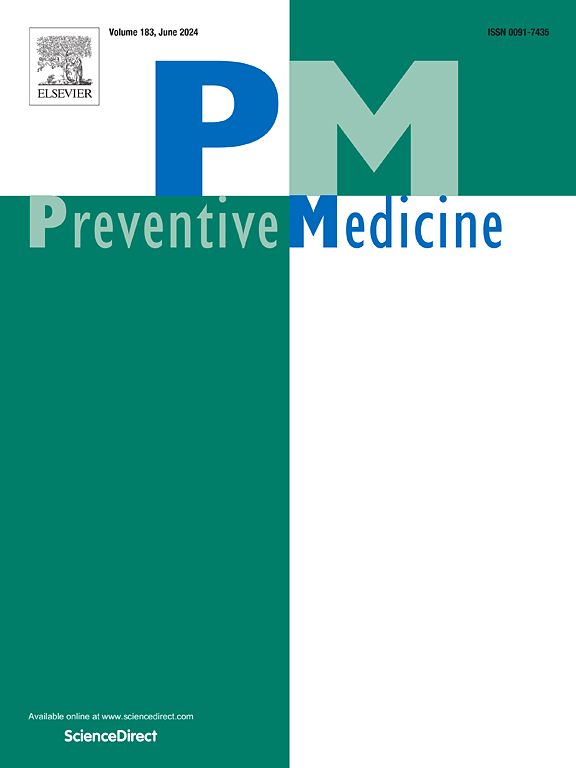Social determinants of health and COVID-19 vaccination: An individual participant data meta-analysis of adult Latino participants
IF 3.2
2区 医学
Q1 MEDICINE, GENERAL & INTERNAL
引用次数: 0
Abstract
Objective
Although disparities in vaccination have been well documented, limited research has examined how specific Social Determinants of Health (SDOH) are associated with COVID-19 vaccination outcomes among Latino subgroups. The aims of the study are to investigate 1) the relative effects of distinct SDOH on reasons for and against vaccination among Latino adults and 2) how these effects may vary by language spoken at home.
Methods
A meta-analysis was conducted utilizing person- and study-level data from 13,406 Latino participants in the United States across 12 study samples from 2020 to 2023. Analyses evaluated SDOH effects on (a) reasons for and (b) against vaccination, as well as (c) the ratio of the two. Three SDOH were entered in a single model to compare their relative effect sizes: education, economic insecurity, and healthcare insecurity.
Results
Education and economic insecurity had the largest effect sizes compared to healthcare insecurity, which was not associated with outcomes. Greater economic insecurity was associated with more reasons against relative to reasons for vaccination. Spanish spoken at home moderated the effect of education levels, increasing both reasons for and against vaccination for highly educated participants, relative to non-Spanish speaking participants.
Conclusions
Findings inform future efforts aimed at reducing health disparities. The overall pattern of results suggests tailored interventions aimed at supporting COVID-19 vaccine attitudes in Latino communities should provide supports early and in accessible formats, particularly for communities with low educational levels and who use Spanish at home.
健康和COVID-19疫苗接种的社会决定因素:成年拉丁裔参与者的个体数据荟萃分析
目的:尽管疫苗接种的差异已被充分记录,但有限的研究调查了特定的健康社会决定因素(SDOH)如何与拉丁裔亚群体的COVID-19疫苗接种结果相关。该研究的目的是调查1)不同的SDOH对拉丁裔成年人接种疫苗的原因和反对接种疫苗的相对影响,以及2)这些影响如何因家庭使用的语言而变化。方法:利用2020年至2023年美国12个研究样本的13406名拉丁裔参与者的个人和研究水平数据进行荟萃分析。分析评估了SDOH对(a)接种疫苗的原因和(b)反对接种疫苗的影响,以及(c)两者的比例。在单一模型中输入三个SDOH来比较它们的相对效应大小:教育、经济不安全感和医疗不安全感。结果:与医疗不安全相比,教育和经济不安全的影响最大,而医疗不安全与结果无关。相对于接种疫苗的原因,更大的经济不安全感与更多的反对理由有关。在家说西班牙语缓和了受教育程度的影响,相对于不讲西班牙语的参与者,受过高等教育的参与者赞成和反对接种疫苗的理由都增加了。结论:研究结果为未来减少健康差距的努力提供了信息。总体结果模式表明,旨在支持拉丁裔社区对COVID-19疫苗态度的量身定制的干预措施应尽早以可获取的形式提供支持,特别是对教育水平低和在家使用西班牙语的社区。
本文章由计算机程序翻译,如有差异,请以英文原文为准。
求助全文
约1分钟内获得全文
求助全文
来源期刊

Preventive medicine
医学-公共卫生、环境卫生与职业卫生
CiteScore
7.70
自引率
3.90%
发文量
0
审稿时长
42 days
期刊介绍:
Founded in 1972 by Ernst Wynder, Preventive Medicine is an international scholarly journal that provides prompt publication of original articles on the science and practice of disease prevention, health promotion, and public health policymaking. Preventive Medicine aims to reward innovation. It will favor insightful observational studies, thoughtful explorations of health data, unsuspected new angles for existing hypotheses, robust randomized controlled trials, and impartial systematic reviews. Preventive Medicine''s ultimate goal is to publish research that will have an impact on the work of practitioners of disease prevention and health promotion, as well as of related disciplines.
 求助内容:
求助内容: 应助结果提醒方式:
应助结果提醒方式:


